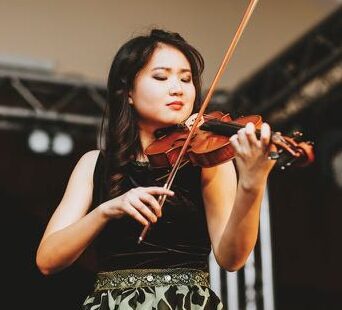A Level Music Course
Ashbourne A level Music students are treated as musicians in their own right and give regular public performances throughout the course to develop both their musicianship and academic understanding of the subject.

Ashbourne A level Music students are treated as musicians in their own right and give regular public performances throughout the course to develop both their musicianship and academic understanding of the subject.

A level Music offers students a sophisticated and technically demanding perspective on an art form that reaches across cultural and linguistic divides and into all walks of life.
You will explore a broad range of musical styles from the 18th century to the present day and develop technically, academically and artistically in a way that is an essential part of preparation for the musical profession as well as a wide choice of career pathways.
Former Ashbourne A level Music students have gone on to secure places at prestigious institutions including Royal Holloway, Birmingham Conservatoire, the Royal College of Music and Russell Group universities as well as moving directly into creative arts and music careers.
Charli produced some fantastic work in all of her subjects, including the composition she is performing in the video below.
“My experience of being a Music student at Ashbourne exceeded all my expectations. My passion and drive for Music was matched and encouraged through the exceptional teaching the college offers. Only now, having left, do I realise just how far I’ve progressed from when I first joined, in terms of technical knowledge and complex musical theory I have now actively been applying to my own work and compositions.”
Charli went straight into a job as Creative Development Assistant for a music development company after achieving outstanding A level results in Film Studies, Music and Drama as well as winning national awards.
Verena started playing the violin from the age of three. She came to Ashbourne as an accomplished musician and went on to study at the Royal Birmingham Conservatoire.
Honestly, I had the best two years of my life as an A level student at Ashbourne. Not only did Ashbourne prepare me extremely well for the A level exams, the music opportunities I was exposed to during my time really helped to develop myself into a better musician. We had at least one music concert every term, plenty of opportunities to play in ensembles as well as having our compositions performed by professional musicians! Ashbourne really focuses on bringing out the individuality and independence of its students.
Aimee achieved her dream of studying Music at university after graduating from Ashbourne. She went on to study at the Royal Holloway University, London.
“My time at Ashbourne was incredible! I made lifelong friendships and learnt how to be independent and manage my time well. Ashbourne was a stepping stone between school and university where I was treated as an adult but was still given the guidance I needed to achieve the results that I wanted to get. I learnt so much, not just about my subjects, but about myself.”
Amy came to Ashbourne with a passion not only for Music, but Physics and Maths. This turned out to be a fantastic combination. After graduating from Ashbourne Amy went on to take a joint degree in Physics and Music at Cardiff University, followed by a masters at the same university in Astrophysics.
My time at Ashbourne was a fun and exciting experience. It had a very relaxed atmosphere which helped me settle in very well. The college’s approach to teaching in the classrooms was very different to traditional sixth form colleges and a lot more informal, which I believe was a great aid in developing my skills in independent study. My teachers and other staff members were very supportive of my passion for Physics, Maths and Music and were an incredible assistance in helping me find an ideal course at university which catered to my interest.
A level Music is a requirement for all Music courses at university and is a well respected qualification in itself. Pathways into a music career are many and varied. You could train as a professional musician and perform at the Royal Albert Hall, compose for the English Ballet, sing at the Royal Opera House, produce blockbuster movie soundtracks, become a rock star, singer songwriter or pop star, compose and record your own tracks, conduct your own orchestra, offer music as therapy, sign up new bands, become a famous session musician, rock the house as a club or radio DJ, write about music, teach and much more.
1. Do I need A-level Music to study music at university?
Yes. Most universities and conservatoires require A-level Music (alongside high-level performance skills) for entry to Music degree courses.
2. What kind of music will I study?
You will study a wide range of styles and genres, from Baroque and Classical to 20th-century and contemporary works. This includes both Western art music and more modern developments in jazz, film, and popular music.
3. What skills will I develop?
You will grow as a performer, composer and analyst. Students develop technical instrumental or vocal skills, explore composition (including use of music technology), and learn to analyse music critically.
4. What careers does A-level Music lead to?
Many of our students go on to study at top universities and conservatoires, preparing for careers as professional musicians, composers, producers, or educators. But the transferable skills, creativity, discipline, performance, and communication, also make Music a strong subject for careers in media, teaching, business, and beyond.